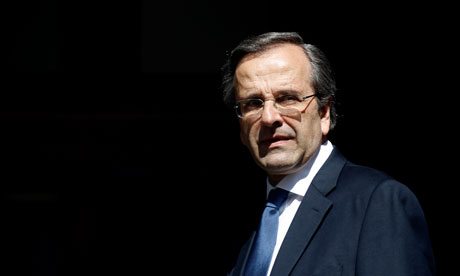As Greece’s leftwing prime minister, Antonis Samaras, prepared to meet eurozone leaders this week for the first time since taking office, a senior ally of German chancellor Angela Merkel has insisted there is no room for concessions to Greece on the conditions of its aid programme and no appetite for a third rescue package, reports The Guardian.
“The Greeks must stick to what they agreed to,” Volker Kauder, the parliamentary leader of Merkel’s conservative bloc, told the weekly Der Spiegel. “There is no more latitude, either on the timeframe or the matter itself, because that would again be a breach of agreements. It is just that which led to this crisis.”
He said Greek bankruptcy would be expensive for Germany, “but agreements must be kept to”.
With Greece in its fifth consecutive year of recession, and social and political discontent rising, Samaras is keen to soften the impact of budget cuts imposed by its lenders and is expected to propose a two-year extension to debt-reduction targets.
Having recovered from eye surgery that has prevented him travelling since June, Samaras will fly to Berlin and Paris to meet Merkel and the French president, François Hollande. Earlier in the week, he will meet the eurozone chief, Jean-Claude Juncker.
The German finance minister, Wolfgang Schäuble, said on Saturday there were limits to the aid that could be granted to Greece and the crisis-stricken country should not expect a third bailout. “It is not responsible to throw money into a bottomless pit,” he said.
But Greece found some support from Juncker, who insisted Greece would not leave the euro unless it “totally refused” to fulfil any of its reform targets. “It will not happen, unless Greece were to violate all requirements and not to stick to any agreement,” he told Austria’s Tiroler Tageszeitung newspaper.
“In case of such total refusal by Greece with regards to budget consolidation and structural reform, one would have to look into the question.”
Juncker said he expected Greece to double its efforts to fulfil its reform targets.
Juncker, who has said a Greek exit from the eurozone would be manageable, added: “Yes, I did say an exit would be manageable. What I meant is that it is technically manageable, but politically it is not manageable and it would be linked to unforeseeable risks.”
Asked what technically manageable meant, he said: “It means that the Greeks would have to reintroduce their own currency. It would take extreme preparation. But the longer we talk about this, the more people get the hypothesis in their heads that work is being done on this. We are not working on this.”
There is a clause in Greece’s €130bn (£102.3bn) bailout deal that says the deficit adjustment period could be extended if its recession is deeper than expected.
The German foreign minister, Guido Westerwelle, said his government would not consider easing the reforms agreed with Athens “in their substance” and called on the Greeks to “take the German government’s position very seriously”, according to the Tagesspiegel am Sonntag newspaper.
Meanwhile the head of Germany’s main industry group told Germany’s Wirtschaftswoche on Saturday that if Greece did not stick to the conditions imposed upon it by the European Union and the International Monetary Fund, “there would no longer be a place for Greece in the euro zone”.
Hans-Peter Keitel, president of the BDI, which had previously insisted Greece remain in the euro zone at all costs, told the business magazine: “The country lacks substantial requisites such as a functioning administration and the express will to get itself out of the crisis.”But European Energy Commissioner Guenther Oettinger said the euro zone should keep Greece on board if at all possible and warned against the unforeseeable consequences of a Greek exit”If we can’t keep a country with 3 percent of Europe’s total debt in the euro zone, nobody will trust us to be able to solve the big problems,” he was quoted as saying in Germany’s Frankfurter Allgemeine Sonntagszeitung.
The former German foreign minister Joschka Fischer also warned against a Greek exit: “If Italy and Spain were to get infected, that would be the end of the euro. Politicians would lose control because the markets would decide on that,” he told Bild am Sonntag.


